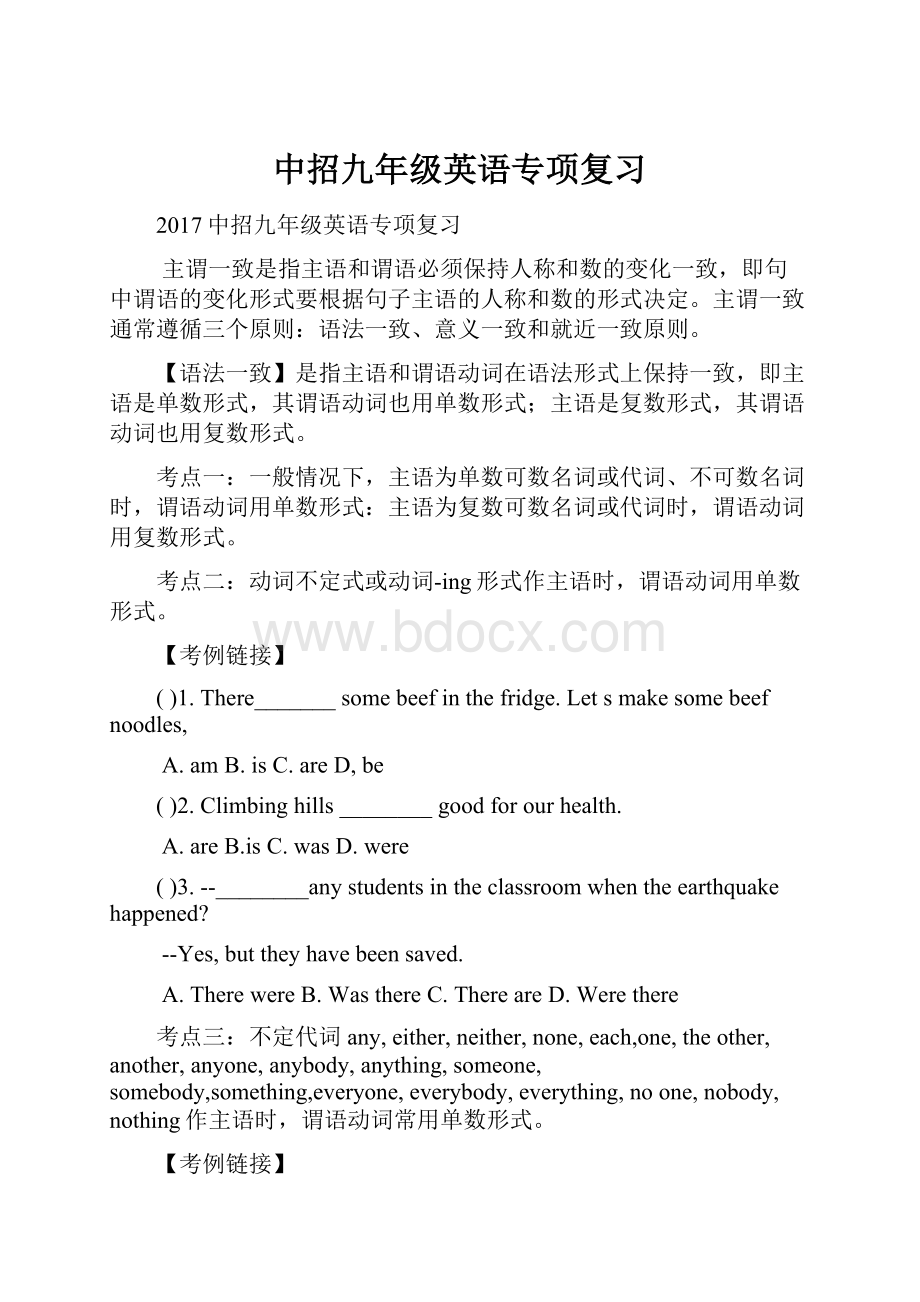中招九年级英语专项复习.docx
《中招九年级英语专项复习.docx》由会员分享,可在线阅读,更多相关《中招九年级英语专项复习.docx(14页珍藏版)》请在冰豆网上搜索。

中招九年级英语专项复习
2017中招九年级英语专项复习
主谓一致是指主语和谓语必须保持人称和数的变化一致,即句中谓语的变化形式要根据句子主语的人称和数的形式决定。
主谓一致通常遵循三个原则:
语法一致、意义一致和就近一致原则。
【语法一致】是指主语和谓语动词在语法形式上保持一致,即主语是单数形式,其谓语动词也用单数形式;主语是复数形式,其谓语动词也用复数形式。
考点一:
一般情况下,主语为单数可数名词或代词、不可数名词时,谓语动词用单数形式:
主语为复数可数名词或代词时,谓语动词用复数形式。
考点二:
动词不定式或动词-ing形式作主语时,谓语动词用单数形式。
【考例链接】
()1.There_______somebeefinthefridge.Letsmakesomebeefnoodles,
A.amB.isC.areD,be
()2.Climbinghills________goodforourhealth.
A.areB.isC.wasD.were
()3.--________anystudentsintheclassroomwhentheearthquakehappened?
--Yes,buttheyhavebeensaved.
A.TherewereB.WasthereC.ThereareD.Werethere
考点三:
不定代词any,either,neither,none,each,one,theother,another,anyone,anybody,anything,someone,somebody,something,everyone,everybody,everything,noone,nobody,nothing作主语时,谓语动词常用单数形式。
【考例链接】
()1.-Whatwouldyoulike,coffeeortea?
--Either_________OK.Idon'tmind.
A.isB.areC.was
()2.Everybody_____________therewhenthemeetingbegan.
A.isB.areC.wasD.were
考点四:
当用and或both…and…连接并列主语时,谓语动词常用复数形式。
考点五:
当主语后面跟有with,except,including,togetherwith.aswellas.inadditionto等词语引导的短语时,谓语动词的单复数形式由主语的单复数形式决定。
【考例链接】
()1.Marywithherparentsoften__________forawalkintheparkaftersupper.
A.goB.isgoingCaregoingD.goes
(()2.Andy,you'dbetternotcatmeatonly.Youshouldknowmilkandfruit________goodforyou.
A.isB.areC.was;D.were
()3.Thesummerholidaysarecoming,sothetwinsaswellasJack__________toHongKongforvacation,
A.isgoingB.aregoingCgoesD.go
()4,--Whatareyougoingtodothisweekend?
--Itogetherwithmyclassmates________goingtoclimbMountQian.
A.isB.amC.areD.were
考点六:
一些由两个部分构成的表示衣物或工具的名词作主语时,谓语动词通常用复数形式,如shoes,trousers,clothes,scissors,chopsticks,glasses等。
但如果这些名词前有“thiskindof,thispairof,aseriesof"’等修饰时,谓语动词一般用单数形式。
【考例链接】
()Thispairofshoes_________mewell,buttheshoesexpensive.
A.fit;areB.fits;areC.fits;is
考点七:
1.“a(large/small)numberof+复数可数名词或代词”作主语时,谓语动词用复数形式:
“thenumberof+复数可数名词或代词”作主语时,谓语动词用单数形式。
2.“分数/百分数+of十名词”和"therestof+名词”作主语时,谓语动词的单复数形式由名词决定。
【考例链接】
()1.Thenumberofthevolunteers________100now.Andasmallnumberofthem________alreadygonetotheworkplace.
A.ishaveB.are,haveC.is,areD.is,has
()2.It'ssaidthat_________ofthewateraroundtheworld______polluted.
A.twothirds;hasB.twothirds;is
Ctwothird;areD.twothirds;have
()3.--Howmanywomendoctorsarethereinyourhospital?
--_________them____overtwenty.
A.Anumberof,;areB.Thenumberof;areC.Thenumberof;is
【意义一致】是指谓语动词和主语的一致不是取决于主语的语法形式,而是由其意义决定。
考点一:
当数词作主语或当表示距离、金额、时间等复数可数名词(词组)作主语肘,常将其看作一个整体,谓语动词用单数形式。
【考例链接】
()1.-Mom,IwatchedTVforonlyfortyminutes.Sometimes__TVisgoodforus.
-Fortyminutes________enough.Nowyoumustdoyourhomework.
A.watch;isB.watching;wasC.watched;areD.watching;wcre
()2.Threemillion____alargenumber.Youcanmakeit_________.
A.are;smallB.is:
smallerC.is:
smallD.are;smaller
考点二:
有些集体名词指复数的人或物,后面用复数谓语,如police;有些集体名词(如family,class,team,group等)作主语时,如果作为一个整体看待,谓语动词用单数形式;如果指集体中的成员,谓语动词用复数形式;当population指居民数目时,谓语动词用单数形式。
【考例链接】
()1.ThepopulationofChina________overl.3billionandChinahasbiggerpopulationthan____intheworld.
A.is;anycountryB.is;anyothercountryC.are;theothercountries
()2.Look!
Thepolice_______thefoodontothebankoftheriver.
A.amcarryingB.iscarrying
C.arecarryingD.arecarried
考点三:
以-s结尾的单数名词如physics,maths,politics等作主语时,谓语动词用单数形式。
【考例链接】
()-Maths____myfavouritesubject.Whataboutyou?
-Physics_______.Ithinkit'sveryinteresting.
A.is:
isB.are;areC.are;is
考点四:
1."the十形容词”表示一类人作主语时,谓语动词常用复数形式。
这类词有thebrave,thepoor,therich,theblind,theyoung,theold,thesick,thedead等。
2."the+姓氏的复数形式”表示一家人或夫妇两人,其作主语时,谓语动词用复数形式。
【考例链接】
()1.Theold________thecoldweathermorethantheyoung.
A.isfeelingB.arefeelingC.feelsD.feel
()2.TheSmiths____aChristmaspartynow.
A.ishavingB.arehavingC,hasD,have
[就近一致]是指谓语动词的数要与其最近的主语在人称和数上保持一致。
考点一:
以or,notonly…butalso…,either…or…,neither…nor...等连接的名词或代词作主语时,谓语动词常与靠近它的主语在人称和数上保持一致。
【考例链接】
()1.Neithertheheadmasternorthereachers____takeavacationnextweek.
A.weregoingtoBisgoing;toC.wasgoingtoD.aregoingto
()2.-Whatwouldyouliketohaveforsupper?
-Eithernoodlesorrice____OK.Idon'tmind.
A.areB.wereC.isD.was
()3.NotonlymyfriendsbutalsoI___________interestedinfootballandMessiisourfavoritestar.
A.beB.amC.isD.are
考点二:
在therebe句型中,如果有两个或两个以上的主语时,常遵循就近一致原则。
【考例链接】
()1.There__________apenandsomerulersonthedeskjustnow.
A.areB.isC.wereD.was
()2.There____lotsofsheepancipigsonmyuncle'sfarmnow
A.wasB.wereC.isD.are
非谓语动词存句中不能单独作谓语,不受主语的人称和数的限制。
非谓语动词是中考考点之一,主要考查动词不定式(两种形式:
带to的不定式和不带to的不定式。
如果不具体说明,一般指的是带to的不定式)和动词-ing形式。
下面我们为大家归纳总结中考中动词不定式和动词-ing形式的常见考点,并进行考例链接。
动词不定式
考点一:
作宾语。
1.只能跟动词不定式作宾语的动词有agree,afford,decide,expect,fail,hope,learn,offer,prepare,plan,promise,refuse,want等。
2.“疑问词+不定式”可以作宾语。
【考例链接】
()1.Theydecided__________abridgeovertheriver.
A.buildB.tobuildC.building
()2.-It'simportantforustoknow____allthesubjects.
-Yeah,groupworkismyfavorite.
A.howtostudyB.whentostudyC.whichtostudyD.whattostudy
考点二:
作宾语补足语,
1.一些动词后常跟动词不定式作宾语补足语,这类动词有advise,allow,ask,call,encourage,invite,order,teach,tell,want,warn等。
2.使役动词(如let,make等)及感官动词(如feel,hear,notice,see,watch等)后跟动词不定式作宾语补足语时须省略to。
注意,在变为被动语态时要加上to。
【考例链接】
()1.Thoughheoftenmadehislittlesister_____,todayhewasmade____byhislittlesister.
A.cry;tocryB.crying;cryingC.cry;cryD.tocry;cry
()2.Thelittlegirlwascryingbecausehermotherdidn'tallowher____theice-cream.
A.eatB.eatsC.toeatD.ate
考点三:
作目的状语。
come,go,stop等动词后常接动词不定式作状语,表示目的。
【考例链接】
()1.Westopped____,buttherewasnotanysound.
A.tolistenB.listensC.listenD.listening
()2.Whenyouleave,pleaseturnoffthelights_________energy.
A.saveB.tosaveC.savingD.saved
考点四:
作主语。
作主语的动词不定式(短语)如果很短,通常位于句首;如果较长,常用it作形式主语,而把真正作主语的动词不定式(短语)放在后面,以避免头重脚轻。
【考例链接】
()l.--It'sdifficultforme____thehomeworkinsuchashorttime.
-Comeon!
I'msureyoucan.
A.finishedB.tofinishC.willfinishD.finishes
()2.It'snecessaryforus____toourparentswhenwehaveproblems.
A.totalkB.talkingC.talk
考点五:
动词不定式的否定式是在to前加not。
【考例链接】
()l.Inthisschool,thestudentsareasked____mobilephones.
A.nottouseBnotusingC.notuseD.tonotuse
()2.Thetrafficsignswarnpeople____afterdrinking.
A.todriveB.nottodriveC.drivingDdon'tdrive
考点六:
在某些固定词组后或某些句型中要用不带to的动词不定式。
如:
hadbetter(not)do,wouldratherdo,Whynotdo…?
Will/Would/Couldyoupleasedo…?
【考例链接】
()1.You'dbetter_________toomuchchocolate,oryou'llgetfatfast.
A.nottoeatB.noteatC.noteating
()2.Forourcomingvacation,why____goingabroadandseeingtheoutsideworld?
A.notconsiderB.toconsiderC.don'tthinkD.notthink
动词-ing形式
考点一:
作宾语。
在初中阶段我们需要掌握的后面跟动词-ing形式作宾语的动词或短语有:
avoid,consider(考虑),dislike,enjoy,finish,imagine,keep,mind,practice,suggest(建议),beafraidof,bebusy,begoodat,beinterestedin,beusedto(习惯于),feellike,giveup,havefun,keepon,lookforwardto,putoff,stopsb./sth.from,thanksfor等。
【考例链接】
()1.Ihaveabadcold.Idon'tfeellike____anything.
A.toeatB.eatingC.eat
()2.--It'stoocoldtoday.Wouldyoumind____thewindow?
-Certainlynot.Goahead.
A.tocloseB.closingC.closeD.closed
()3.-Chinaisgettingbetterandbetteratmakinghightechnologyproducts.
-That'sright.Peoplearoundtheworldcanhardlyavoid____productsmadeinChina.
A.notbuyingB.nottobuyC.tobuyD.buying
考点二:
作宾语补足语。
’见下面“动词不定式和动词-ing形式易混点考点
考点三:
作主语。
()OurEnglishteacheroftensaystous,“_______Englishwellisveryimportant."
A.LearnB.LearningC.LearnedD.Tolearning
考点四:
作定语。
()Look!
Therearesomebirds____inthesky.Theyareverybeautiful.
A.toflyB.flyC.flyingD.flown
动词不定式和动词-ing形式易混点
forget/rememberdoingsth.→忘记/记得做过某
meantodosth.→打算去做某事
meandoingsth→意味着做某事
needtodosth.→需要去做某事
needdoingsth.→需要被做
regrettodosth.→遗憾要做某事
regretdoingsth.→后悔曾经做了某事
stoptodosth.→停下来去做某事
stopdoingsth.→停止做某事
trytodosth.→设法做某'葬
trydoingsth.→尝试做某事
usedtodosth.→过去常常做某事
beusedtodoingsth.→习惯于做某事
【考例链接】
()1.-Didyoutalkbacktoyourmotherwhenyouwereachild?
--Yes.ButniowIrealizeIwaswrong.Ireallyregret_______thatsillythingtomymum.
A.doB.todoC.doingD.did
()2,Don'tforget____ittomewhenyoufinishreadingthebook.
A.tobringB.bringingC.bring
()3.-Whatdoyouusuallyhaveforbreakfast?
-Iusedto___________dumplings,butthesedaysI'm
usedto____breadandmilk.
A.eat;haveB.eating;havingC.eating;haveD.eat;having
()4.Don'tthrowawaythewastepaper.Itneeds______sothatitcanbereused.
A.todestroyB.destroyingC.tocollectD.collecting
考点二:
两者作宾语补足语的区别。
感官动词(如feel,hear,notice,see,watch等)后既可跟不带to的动词不定式作宾语补足语,也可以跟动词-ing形式作宾语补足语。
前者表示动作的全过程,后者表示动作正在进行。
【考例链接】
()1.IheardTom____whenIwalkedpasthisroomyesterday.
A.singB.singingC.tosingD.sang
()2.Weofienhearsomestudents____spokenEnglishintheEnglishcorner.
A.practicedB.practicingC.practiceD.waspracticing
巩固练习
从A、B、C、D)三或四个选项中选择可以填入空白处的最佳答案。
()1.Thetwins__________fondofthenewideainthemagazinearticle.
A.beB.amC.isD.are
()2.Awomanwithayoungboy____gettingintoUncle'scar.
A.isB.areC.has
()3.There____anumberofbooksinthelibraryandthenumberofthem____increasing.
A.has:
isB.have;areC.are;isD.is:
are
()4.Weeach_______WeChatnowadays,eventheoldpeople.
AplayB.playsC、playing
()5.Look!
Thisisourclassphoto.There_